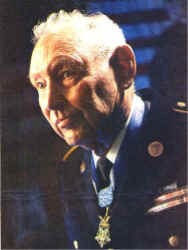““When you come right down to it, leadership is, of course, being exerted all the time in the capacity of boosting morale, confidence and all that, but leadership is most noticeable when tough decisions finally have to be made. This is the time when you get conflicting advice and urgent advice of every kind. Now this is the kind of leadership that’s often concealed from the public.… But making decisions is of the essence in leadership—that is, handling large problems whether or not you are at war or at peace. When you make these decisions it is not done with any reaching for the dramatic. It is almost everyday and commonplace. You reach a conclusion based upon the facts as you see them, the evaluations of the several factors as you see them, the relationship of one fact to another, and, above all, your convictions as to the capacity of different individuals to fit into these different places. You come to a decision after you’ve taken all these things into consideration. Then you decide and say, ‘That’s what we’ll do.’” General Dwight D. Eisenhower
— American Generalship: Character Is Everything: The Art of Command by Edgar Puryear
Sin Through Weakness and Goodness
Bad and mediocre people are tempted to sin by their own habitual weaknesses. The earlier lies or thefts or adulteries make the next one that much easier to contemplate. Having already cut so many corners, the thinking goes, what’s one more here or there? Why even aspire to virtues that you probably won’t achieve, when it’s easier to remain the sinner that you already know yourself to be?
But good, heroic people are led into temptation by their very goodness – by the illusion, common to those who have done important deeds, that they have higher responsibilities than the ordinary run of humankind. It’s precisely in the service to these supposed higher responsibilities that they often let more basic ones slip away. – Ross Douthat, New York Times, November 13, 2011
Running Faster for the Camera
 I was nearing the end of my semi-routine run along Lady Bird Lake in Austin Texas when on the trail in front of me was a yellow sign announcing the filming of the movie “When Angels Sing” and warned that traveling beyond the sign “constitutes your consent to be recorded.” Naturally I did what most American men would do; I pepped up my step, fixed my posture, and ran on through hoping for a split-second opportunity to tell my daughters “THERE I AM” in a movie theater. In the small (microscopic) chance I make it onto the big screen my daughters will see an image of an athlete but miss the reality of their father gasping for air just off screen. What they see was temporary, the unseen is real.
I was nearing the end of my semi-routine run along Lady Bird Lake in Austin Texas when on the trail in front of me was a yellow sign announcing the filming of the movie “When Angels Sing” and warned that traveling beyond the sign “constitutes your consent to be recorded.” Naturally I did what most American men would do; I pepped up my step, fixed my posture, and ran on through hoping for a split-second opportunity to tell my daughters “THERE I AM” in a movie theater. In the small (microscopic) chance I make it onto the big screen my daughters will see an image of an athlete but miss the reality of their father gasping for air just off screen. What they see was temporary, the unseen is real.
I’m reminded of Paul’s message to the church in Corinth who must have been going through spiritual battles causing them to lose sight of greater rewards. The church had been focusing on an image they thought was real and losing heart in the process. Paul is telling them to look just off screen at the eternal glory that is unseen but oh so real.
Therefore we do not lose heart. Though outwardly we are wasting away, yet inwardly we are being renewed day by day. For our light and momentary troubles are achieving for us an eternal glory that far outweighs them all. So we fix our eyes not on what is seen, but on what is unseen, since what is seen is temporary, but what is unseen is eternal. 2 Corinthians 4:16-18 (NIV)
Making a Change at Church: Eight (not so) Simple Steps
In a previous post I quoted John Maxell who observed that older and “insecure leaders view change as a threat rather than an opportunity. ” But what if you have to change.
Many small churches are facing declining membership because their traditions have not changed in decades. The prevailing belief is worship traditions are Biblical and any deviation must certainly be a sin. Even though largely attracted to the spiritual (review the popular movies today) , younger generations are increasingly turned off by what they see as rigid and irrelevant. (more…)
Real Life
Real life isn’t always going to be perfect or go our way, but the recurring acknowledgment of what is working in our lives can help us not only to survive but surmount our difficulties – Sarah Ban Breathnach
Your Real Life
The great thing, if one can, is to stop regarding all unpleasant things as interruptions of ones “own” or “real” life. The truth is of course that what one calls the interruptions are precisely one’s real life – the life God is sending one day by day. – C.S. Lewis
Humility, the Basic Leadership Virtue
Benedict believed the basic leadership virtue was humility. Leaders had to demonstrate competence and ambition, but their passion was to derive from a desire to improve and contribute to the health of the organization, not from individual ego. He believed that true humility was a skill one had to learn and practice.
John Mount, in a Forbes.com review of the book The Benedictine Rule of Leadership: Classic Management Secrets You Can Use Today
by Craig and Oliver Galbraith
Don’t Invite Them In
“We cannot control the parade of negative thoughts marching through our minds. But we can choose which ones we will give our attention to. Picture your thoughts as people passing by the front of your home. Just because they’re walking by doesn’t mean you have to invite them in.” Gladys Edmunds
Leadership Lessons From A Janitor
 The following leadership lesson was circulated around our organization today. I’ve read this before, was inspired, and moved on to the popular leadership theories and acronyms of more “modern” leader training. But this is a story that deserves to be revisited often, it teaches lessons lacking in today’s leaders. In an article published in the Warton Leadership Digest James E. Moschgat (at the time a Colonel in Command of the 12th Operations Group, 12th Flying Training Wing, Randolph Air Force Base, Texas) writes about the squadron janitor at the Air Force Academy who was discovered to be a Congressional Medal of Honor winner. The janitor was William John Crawford who earned a Medal of Honor while serving in Italy with the 36th Infantry Division but went on to become a leadership inspiration to Colonel Moschgat. (more…)
The following leadership lesson was circulated around our organization today. I’ve read this before, was inspired, and moved on to the popular leadership theories and acronyms of more “modern” leader training. But this is a story that deserves to be revisited often, it teaches lessons lacking in today’s leaders. In an article published in the Warton Leadership Digest James E. Moschgat (at the time a Colonel in Command of the 12th Operations Group, 12th Flying Training Wing, Randolph Air Force Base, Texas) writes about the squadron janitor at the Air Force Academy who was discovered to be a Congressional Medal of Honor winner. The janitor was William John Crawford who earned a Medal of Honor while serving in Italy with the 36th Infantry Division but went on to become a leadership inspiration to Colonel Moschgat. (more…)
Improved Mental Fitness Through Physical Fitness
Leader wellness requires physical, mental, emotional, and spiritual fitness. As I was thumbing through an in-flight magazine today I noticed an article citing research that I’ve long suspected; moderate exercise benefits not only physical well being but also our mental. Most of us have been through intermittent periods of exercise or non-exercise with higher fatigue, irritablility, and higher stress during the periods inactivity.
I hold that regular and moderate exercise helps me contend with the physical and mental demands I face. When I get off of an exercise routine (which is often) even for a few weeks the results are never positive. Turns out I’m apparently correct. Exercise influences a multitude of pysiological and phsychological factors including circulation of mood-linked neurotransmitters serotonin and dopamine as well as helping work off anxiety-producing adrenaline. According to Dr Tedd Mitchell MD of the Dallas-based Cooper clinic reducing adrenaline is like “taking a dose of a tranquilizer.”.
New studies are showing that exercise may build a protective effect. Animal studies suggest that long-term moderate exercise may cause a lessened response to stressful stimuli. Researchers at the University of Colorado at Boulder are finding that lab rats who exercised on a wheel every day for six weeks reacted better to sudden stress compared to the sedintary rats.
These initial findings indicate the mental benefits of exercise last after effects of serotonin, dopamine, adrenaline reduction wear off.
New research is proving that what’s good for the body is good for the mind too. – Charlotte Huff
From “Mental Fitness” in Celebrate Living magazine
